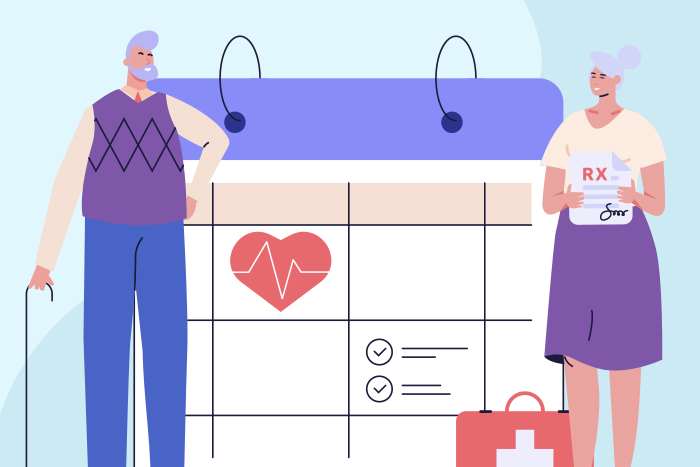Age 65 or older? Preventive screenings to keep in mind.
Regular check-ups and screenings become more important than ever as you get older and reach your 60s. They help catch health problems early—often before symptoms show up. And when issues are found early, treatment is usually easier and more successful.
That’s why preventive screenings are such a powerful tool for staying healthy and independent. Medicare covers many of these services, and your doctor can help guide you on what’s needed and when.
Here’s a look at the key screenings recommended for adults 65 and older: what they are, how often to get them, and why they matter.
1. Colon Cancer Screening
What It Checks For: Colon cancer and precancerous polyps in the large intestine.
Why It Matters: Colon cancer often starts without symptoms. Screenings can catch it early—or even prevent it.
How It’s Done: Options include a colonoscopy every 10 years, or non-invasive stool tests (like FIT or Cologuard) every 1-3 years.
Who Should Get It: Adults up to age 75, or longer if your doctor recommends. People with a family history or past polyps may need to screen earlier or more often.
2. Bone Density Scan (DEXA)
What It Checks For: Osteoporosis, or thinning bones.
Why It Matters: Weakened bones can break easily, especially in women after menopause. A bone fracture can lead to long recovery times and loss of mobility.
How It’s Done: A painless scan that measures bone strength in your hips and spine.
Who Should Get It: Women 65+ and men 70+, or sooner if you’ve had fractures or other risk factors (like taking steroid medications).
3. Blood Pressure Check
What It Checks For: High blood pressure (hypertension).
Why It Matters: High blood pressure increases your risk of heart attack, stroke, and kidney damage—often without symptoms.
How It’s Done: A simple arm cuff test.
Who Should Get It: At least every year, or more often if your levels are high.
4. Cholesterol and Lipid Panel
What It Checks For: LDL (“bad”) cholesterol, HDL (“good”) cholesterol, and triglycerides.
Why It Matters: High cholesterol raises the risk of heart disease and stroke.
How It’s Done: A blood test, sometimes requiring fasting.
Who Should Get It: Every year, sometimes more frequently if you have additional risk factors for heart disease.
5. Blood Sugar or A1C Test
What It Checks For: Prediabetes or diabetes.
Why It Matters: Diabetes is common in older adults and can lead to serious health issues.
How It’s Done: A simple blood draw.
Who Should Get It: Every 3 years, or more often if you have risk factors like being overweight or having high blood pressure.
6. For Women: Mammogram
What It Checks For: Lumps and abnormalities in the breast tissue, including breast cancer.
Why It Matters: Finding breast cancer early gives more treatment options and better outcomes.
How It’s Done: A low-dose X-ray of the breast.
Who Should Get It: Women 65 and older should talk with their doctor about how often to screen. Most continue every 1-2 years, depending on health history.
7. For Women: Cervical Cancer Screening
What It Checks For: Abnormal cells in the cervix that could lead to cancer.
Why It Matters: Cervical cancer is rare in older women, but still possible.
How It’s Done: Pap test or HPV test (or both).
Who Should Get It: Women may be able to stop screening after age 65 if they’ve had regular, normal results in the past 10 years. Talk to your doctor to see what’s right for you.
8. For Men: Prostate Cancer Screening (PSA Test)
What It Checks For: Prostate-specific antigen, a marker that may point to prostate cancer.
Why It Matters: PSA levels can help detect prostate problems early, but not all prostate cancers are dangerous. Many grow slowly and may not cause harm, especially if detected early.
How It’s Done: A simple blood test.
Who Should Get It: Men should talk with their doctor about the pros and cons after age 65. Some may choose to stop testing depending on health status.
9. Lung Cancer Screening
What It Checks For: Signs of lung cancer in people at higher risk.
Why It Matters: Catching lung cancer early improves survival.
How It’s Done: A quick, low-dose CT scan.
Who Should Get It: Adults aged 50-80 who currently smoke or quit in the last 15 years and have a 20-pack per year smoking history. Your doctor can help calculate this and decide if screening is right for you.
10. Vision and Hearing Checks
What They Check For: Vision loss, cataracts, glaucoma, and hearing loss.
Why They Matter: These changes can affect safety, increase fall risk, and contribute to cognitive decline.
How They’re Done: Eye exams and hearing tests by specialists.
Who Should Get Them: At least every 1-2 years, or sooner if you notice changes.
11. Depression Screening
What It Checks For: Symptoms of depression or mood disorders.
Why It Matters: Mental health is just as important as physical health, especially during life changes or after loss.
How It’s Done: A short questionnaire during your annual wellness visit.
Who Should Get It: Annually, or as needed.
Stay Informed About Your Health
Preventive screenings help you stay ahead of health problems. They may feel small, but they can have a big impact on your quality of life. Make a checklist, talk to your doctor, and don’t be afraid to ask questions.
Your health is worth the time. And staying on top of these screenings helps you stay independent, active, and well.
Sources:
Medicare.gov: https://www.medicare.gov/coverage/preventive-screening-services
Mayo Clinic: https://communityhealth.mayoclinic.org/prevention-and-wellness/adult
U.S. Preventive Services Task Force: https://www.uspreventiveservicestaskforce.org/uspstf/
American Cancer Society: https://www.cancer.org/cancer/screening.html

